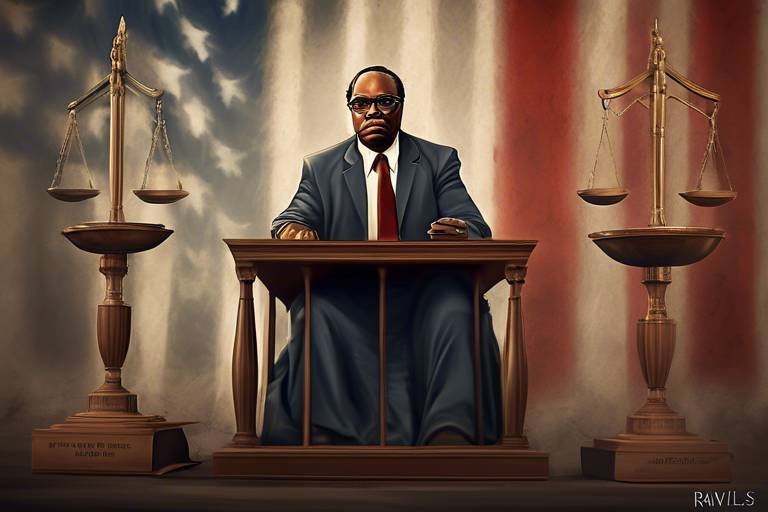The Philosophy and Politics of Death Penalty
The death penalty, often seen as one of the most contentious issues in modern society, raises profound questions about morality, justice, and the role of the state. At its core, the debate revolves around whether capital punishment serves as a necessary tool for societal protection or whether it represents a grave injustice that undermines the very principles it seeks to uphold. As we delve into the intricate web of philosophical arguments and political influences surrounding the death penalty, we uncover layers of ethical dilemmas, societal impacts, and a myriad of global perspectives that challenge our understanding of justice.
Throughout history, the death penalty has been a reflection of a society's values and beliefs. In some cultures, it is viewed as a legitimate form of retribution, a way to ensure that those who commit heinous crimes face the ultimate consequence. But is this truly a justifiable stance? Proponents argue that capital punishment serves not only as a form of punishment but also as a deterrent against future crimes. They assert that by imposing the death penalty, society sends a clear message that certain actions are intolerable and will not be tolerated. However, this raises the question: does fear of death truly prevent individuals from committing crimes, or does it merely serve as a temporary solution to a much deeper societal issue?
On the flip side, opponents of the death penalty present a compelling case against its use. They argue that the risk of wrongful convictions is too great, and the irreversible nature of capital punishment means that an innocent person could pay the ultimate price for a crime they did not commit. Furthermore, they highlight the moral implications of state-sanctioned killing, questioning whether it is ethical for a society to take a life, even in the name of justice. The potential for bias in the application of the death penalty based on race, socio-economic status, and other factors adds another layer of complexity to the debate. These concerns lead us to ponder: can a system that is so prone to error and discrimination truly be considered just?
Proponents of the death penalty often argue from a retributive justice perspective, believing that it serves as a moral response to heinous crimes, reflecting society's condemnation of severe wrongdoing. They contend that certain crimes are so egregious that the only appropriate response is death. This belief is rooted in the idea that justice must be served and that the punishment must fit the crime. In this sense, the death penalty is seen as a way to restore balance to a society that has been disrupted by violence and wrongdoing. The argument here is that allowing murderers to live, particularly those who have committed particularly brutal acts, diminishes the value of the lives they have taken.
Opponents argue that the death penalty is inherently flawed, raising concerns about wrongful convictions, moral implications, and the potential for disproportionate application based on race and socio-economic status. They point to numerous cases where individuals on death row were later exonerated, highlighting the fallibility of the justice system. Moreover, the ethical dilemma of taking a life as punishment poses significant moral questions. Is it justifiable for the state to engage in acts of violence, even against those deemed guilty? The debate continues, with many advocating for life imprisonment as a more humane alternative that allows for the possibility of redemption and rehabilitation.
The effectiveness of the death penalty as a deterrent to crime remains a contentious issue, with studies producing mixed results on whether capital punishment truly prevents future offenses. While some research suggests that the death penalty may deter certain violent crimes, others argue that the evidence is inconclusive. This raises an important question: if the primary justification for the death penalty is deterrence, can we truly rely on it as an effective means of crime prevention?
Examining crime rates in regions with and without the death penalty can provide insight into its alleged deterrent effect. However, conclusions often vary based on numerous influencing factors, including socio-economic conditions, law enforcement practices, and cultural attitudes toward crime and punishment. For instance, some studies have shown that states in the U.S. with the death penalty do not necessarily have lower crime rates compared to those without it. This inconsistency leads to further skepticism about the death penalty's effectiveness as a deterrent.
Psychological theories suggest that individuals may not consider the consequences of their actions when committing crimes, challenging the assumption that the death penalty deters potential offenders. Many crimes are committed in moments of passion or under the influence of drugs or alcohol, where the thought of potential punishment is far removed from the perpetrator's mind. This perspective invites us to reconsider the motivations behind criminal behavior and whether fear of execution can genuinely influence decision-making.
Different countries approach the death penalty with varying degrees of acceptance and implementation, influenced by cultural, legal, and political factors that shape their justice systems. In some nations, capital punishment is still a common practice, while others have abolished it altogether in favor of more rehabilitative approaches. This disparity raises questions about the universality of human rights and whether it is appropriate for one culture to impose its values on another. As we explore these global perspectives, we gain a deeper understanding of how societal norms and beliefs shape the discourse on capital punishment.
Political ideologies significantly impact the stance on the death penalty, with certain parties advocating for its abolition while others support its continuation as a tool for justice and order. The political landscape often reflects broader societal attitudes, with shifts in public opinion leading to changes in legislation. This relationship between politics and capital punishment highlights the importance of civic engagement and the role of citizens in shaping their justice systems.
Public sentiment regarding the death penalty fluctuates over time, influenced by high-profile cases, media coverage, and changing societal values. When a particularly heinous crime captures the public's attention, support for the death penalty often surges, leading to renewed calls for its implementation. Conversely, as awareness of wrongful convictions and racial disparities grows, public support may wane. This dynamic relationship underscores the importance of informed public discourse in shaping policies surrounding capital punishment.
International human rights frameworks often challenge the legitimacy of the death penalty, leading to debates about sovereignty, cultural practices, and the push for global abolition. Organizations such as the United Nations advocate for the abolition of capital punishment, framing it as a violation of the right to life. This advocacy raises important questions about the role of international law in influencing national policies and the extent to which cultural practices should be respected in the face of universal human rights.
- What is the main argument for the death penalty? Proponents argue that it serves as a form of retribution and a deterrent against heinous crimes.
- What are the main arguments against the death penalty? Critics highlight the risk of wrongful convictions, moral implications, and potential biases in its application.
- Does the death penalty actually deter crime? Studies show mixed results, with some suggesting it may deter violent crime while others argue it does not.
- How do different countries view the death penalty? Countries vary widely in their acceptance and implementation of the death penalty, influenced by cultural, legal, and political factors.
- What role does public opinion play in the death penalty debate? Public sentiment can significantly influence political decisions and legislation regarding capital punishment.

Ethical Arguments for Capital Punishment
Proponents of the death penalty often argue from a retributive justice perspective, believing that it serves as a moral response to heinous crimes. The idea is simple yet profound: when someone commits a crime so atrocious, such as murder or acts of terrorism, they deserve to face a punishment that reflects the severity of their actions. This perspective is rooted in a fundamental belief that justice must be served, and that society has a duty to express its condemnation of severe wrongdoing. The death penalty, in this view, is not merely about punishment; it is about restoring balance to a universe that has been tilted by the actions of a criminal.
Supporters argue that the death penalty provides a sense of closure for victims' families, allowing them to feel that justice has been served. Imagine the emotional turmoil faced by families who have lost loved ones to violent crimes; the death penalty offers them a tangible resolution. It symbolizes society's commitment to ensuring that those who commit such acts cannot harm anyone else again. This notion of closure is often cited as a compelling reason to maintain capital punishment in our legal systems.
Moreover, advocates assert that the death penalty acts as a powerful symbolic message against crime. By enforcing the ultimate punishment for the most egregious offenses, society sends a clear signal that certain actions are intolerable. This is akin to a parent setting strict rules for their children; when a rule is broken, the consequences must match the severity of the action to instill a sense of right and wrong. In this sense, the death penalty serves not only as a punishment but also as a deterrent, emphasizing that society will not tolerate extreme violence.
Additionally, some argue that the death penalty can be seen as a tool for social order. In a world where crime can often seem rampant and unchecked, the death penalty is perceived as a necessary measure to maintain societal norms and values. It reinforces the idea that the state has the authority to protect its citizens and uphold justice. The belief is that without such measures, chaos could ensue, leading to a breakdown of law and order.
However, it is crucial to acknowledge that these arguments, while compelling, are not without their challenges. Critics often point out the potential for discrimination in the application of the death penalty, raising questions about whether it is applied equally across different races and socio-economic backgrounds. The debate continues as to whether the death penalty truly serves the purpose of justice or if it merely perpetuates a cycle of violence and retribution.
In conclusion, the ethical arguments for capital punishment are deeply rooted in the principles of justice, closure for victims' families, and the maintenance of social order. While supporters passionately advocate for its continuation, the ongoing discussions about its implications and effectiveness remind us that the conversation surrounding the death penalty is far from over. As society evolves, so too must our understanding of justice and punishment, prompting us to continually reassess the moral foundations of our legal systems.
- What is retributive justice? Retributive justice is a theory of justice that emphasizes punishment as a response to wrongdoing, aiming to ensure that the punishment fits the crime.
- How does the death penalty provide closure for victims' families? Many families believe that seeing the perpetrator punished with the death penalty allows them to feel a sense of justice and resolution after their loss.
- Does the death penalty deter crime? The effectiveness of the death penalty as a deterrent is debated, with studies producing mixed results on whether it actually prevents future crimes.
- Are there concerns about discrimination in the application of the death penalty? Yes, critics argue that the death penalty is often applied disproportionately based on race and socio-economic status, leading to ethical concerns.

Ethical Arguments Against Capital Punishment
When we delve into the ethical arguments against capital punishment, we find a myriad of concerns that challenge the very foundation of this controversial practice. One of the most significant issues raised is the risk of wrongful convictions. Imagine being sentenced to death for a crime you didn’t commit; the thought alone sends shivers down the spine. Studies have shown that the justice system is not infallible, and innocent lives have been lost due to judicial errors. This raises a crucial question: how can we justify a punishment that is irreversible?
Furthermore, the moral implications of taking a life, even in the name of justice, cannot be overlooked. Many argue that the state should not engage in actions that it condemns in others. If we claim to uphold values of life and dignity, how can we reconcile that with the act of executing individuals? This contradiction poses a profound ethical dilemma, leading to the belief that capital punishment reflects a failure of society to address crime through rehabilitation and restorative justice.
Another critical point of contention is the disproportionate application of the death penalty, particularly concerning race and socio-economic status. Data consistently shows that marginalized communities are more likely to receive capital sentences, raising alarms about systemic biases within the legal framework. For instance, studies indicate that defendants of color are significantly more likely to be sentenced to death compared to their white counterparts for similar crimes. This disparity begs the question: is justice truly blind, or does it wear tinted glasses?
Moreover, the emotional and psychological toll on the families of both victims and those on death row adds another layer to the ethical debate. The prolonged process of appeals and the uncertainty surrounding execution dates can lead to severe mental anguish for those involved. Families are left in a state of limbo, waiting for a resolution that may never come. This suffering is often overlooked in discussions about capital punishment, yet it highlights the broader societal impacts of such a final decision.
In addition to these arguments, there are broader societal implications to consider. The death penalty does not exist in a vacuum; it reflects and shapes societal values and norms. By endorsing capital punishment, society may inadvertently condone violence as a solution to conflict, which can perpetuate a cycle of violence rather than promote healing and understanding. The moral fabric of society is at stake when we accept the notion that killing is an acceptable form of justice.
To summarize, the ethical arguments against capital punishment are multifaceted and deeply intertwined with issues of justice, morality, and societal values. The potential for wrongful convictions, the moral contradictions inherent in state-sanctioned killing, the disproportionate impacts on marginalized communities, and the emotional toll on families all contribute to a compelling case against the death penalty. As we navigate this complex issue, it is essential to consider not only the legal implications but also the profound ethical questions that challenge our understanding of justice.
- What are the primary ethical concerns regarding the death penalty? The main concerns include the risk of wrongful convictions, moral implications of state-sanctioned killing, and disproportionate impacts on marginalized communities.
- How does the death penalty affect families of victims and offenders? Families often experience prolonged emotional distress due to the lengthy legal processes and uncertainty surrounding executions.
- Are there alternatives to capital punishment? Yes, alternatives such as life imprisonment without parole focus on rehabilitation and restorative justice rather than retribution.

The Role of Deterrence
The concept of deterrence is at the heart of the debate surrounding the death penalty. Proponents argue that the ultimate punishment serves as a powerful warning to would-be criminals, instilling fear that their actions could lead to the most severe consequence imaginable. But does this fear truly translate into reduced crime rates? This question is not just a matter of opinion; it dives deep into the realms of psychology and sociology. When we think about deterrence, we must consider whether individuals actually weigh the consequences of their actions before committing a crime. Are they really thinking, "If I do this, I might get the death penalty"? Or is this a more abstract consideration, one that doesn't play a significant role in the heat of the moment?
Research on the effectiveness of the death penalty as a deterrent has produced a mixed bag of results. Some studies suggest that states with capital punishment experience lower murder rates, while others indicate that there is no significant difference when compared to states without it. This inconsistency raises crucial questions: Is the death penalty a reliable deterrent, or are other factors influencing crime rates more significantly? For instance, socioeconomic conditions, law enforcement practices, and community programs can all play pivotal roles in crime prevention.
To further illustrate this point, let's consider a few statistics:
| Region | Crime Rate (per 100,000 people) | Death Penalty Status |
|---|---|---|
| Region A | 4.5 | Active |
| Region B | 4.2 | Inactive |
| Region C | 5.0 | Active |
| Region D | 3.8 | Inactive |
As seen in the table above, regions with and without the death penalty exhibit varying crime rates, but drawing direct correlations is challenging. The complexity of crime causation means that attributing changes in crime rates solely to the presence or absence of capital punishment oversimplifies the issue. Moreover, psychological theories suggest that many individuals commit crimes in a state of emotional turmoil or under the influence, rendering the death penalty's deterrent effect moot in those instances.
Ultimately, the role of deterrence in the death penalty debate is a multifaceted issue. It forces us to confront uncomfortable truths about human behavior, societal norms, and the effectiveness of our justice system. Are we, as a society, willing to accept capital punishment as a necessary evil to curb crime, or do we believe in rehabilitative justice that addresses the root causes of criminal behavior? This ongoing debate will continue to shape the political landscape and influence public opinion as we strive to understand the true impact of the death penalty on crime rates.
- Does the death penalty deter crime? The effectiveness of the death penalty as a deterrent is highly debated, with studies showing mixed results.
- What factors influence crime rates besides the death penalty? Socioeconomic conditions, law enforcement practices, and community programs can significantly impact crime rates.
- Are there psychological factors that affect deterrence? Yes, emotional states and external influences often play a crucial role in decision-making during a crime.

Comparative Analysis of Crime Rates
The debate surrounding the death penalty often hinges on its perceived effectiveness as a deterrent to crime. To truly understand this complex issue, we must delve into a in regions that enforce capital punishment versus those that do not. This analysis can be likened to examining two sides of a coin—both sides offer valuable insights, yet they may lead to vastly different conclusions.
In jurisdictions where the death penalty is actively implemented, proponents argue that the mere existence of this ultimate punishment serves as a powerful deterrent. They maintain that the fear of facing capital punishment can dissuade potential criminals from committing heinous acts. However, the reality is often more nuanced. Studies conducted in various countries have shown mixed results, with some indicating a correlation between the death penalty and lower crime rates, while others reveal no significant difference. For instance, a recent study highlighted that states in the U.S. with the death penalty did not necessarily experience lower murder rates compared to those without it.
To provide a clearer picture, let's consider a
| Country | Death Penalty Status | Murder Rate (per 100,000) |
|---|---|---|
| United States | Yes | 5.0 |
| Canada | No | 1.8 |
| Japan | Yes | 0.3 |
| Norway | No | 0.6 |
This table illustrates that countries with the death penalty, such as the United States and Japan, have varying murder rates, and interestingly, some countries without the death penalty, like Canada and Norway, boast significantly lower rates. This raises an important question: does the death penalty truly act as a deterrent, or are there other factors at play?
Another crucial aspect to consider is the social context in which crime occurs. Factors such as economic conditions, education, and social inequality can heavily influence crime rates. For instance, a region plagued by poverty and lack of opportunities may see higher crime rates regardless of its stance on capital punishment. Therefore, it's essential to adopt a holistic view when analyzing crime statistics—one that considers not only the legal framework but also the underlying societal issues that contribute to criminal behavior.
Moreover, psychological perspectives challenge the notion that potential offenders weigh the consequences of their actions before committing crimes. Many studies suggest that individuals engaged in criminal activities often act impulsively or under the influence of various stressors, which can cloud their judgment. Thus, the idea that the death penalty serves as a deterrent may be more of a societal belief than a proven fact.
In conclusion, the comparative analysis of crime rates in regions with and without the death penalty presents a complex tapestry of data and interpretations. While some may argue in favor of its deterrent effect, the evidence remains inconclusive and often contradictory. As we continue to explore this multifaceted issue, it becomes increasingly clear that understanding crime rates requires a comprehensive approach that goes beyond the binary of capital punishment.
- Does the death penalty effectively deter crime? The effectiveness of the death penalty as a deterrent remains a contentious topic, with studies showing mixed results.
- What are the ethical concerns surrounding the death penalty? Ethical concerns include the potential for wrongful convictions, moral implications, and issues of racial and socio-economic disparities.
- How do international perspectives on the death penalty differ? Different countries have varying views on capital punishment, influenced by cultural, legal, and political factors.
- How does public opinion impact the death penalty? Public sentiment can fluctuate, often influenced by media coverage and high-profile cases, which in turn can affect political decisions and legislation.

Psychological Perspectives on Deterrence
The debate surrounding the death penalty often hinges on its perceived effectiveness as a deterrent to crime. However, when we delve into the psychological perspectives on deterrence, things become a bit murkier. One might assume that the fear of facing the ultimate punishment would dissuade individuals from committing heinous acts, but psychological theories suggest that this assumption is fundamentally flawed.
For starters, many individuals who commit serious crimes often do so in a state of heightened emotion or under the influence of substances, where rational thinking takes a backseat. In these moments, the consequences of their actions may not be at the forefront of their minds. It's like trying to convince a child not to touch a hot stove; the immediate desire to explore often overshadows the fear of getting burned. This analogy illustrates how the prospect of execution might not even register as a deterrent for someone in a volatile state.
Moreover, psychological studies indicate that the perception of certainty and swiftness of punishment plays a more significant role in deterring crime than the severity of the punishment itself. If potential offenders believe that they are unlikely to be caught or that the legal process will drag on for years, the death penalty becomes less of a threat. In fact, the certainty of punishment is often highlighted as a more effective deterrent than the harshness of the punishment. This brings us to the crucial point: if the death penalty is not consistently applied, its deterrent effect diminishes significantly.
Additionally, a fascinating aspect of human psychology is the concept of moral disengagement. This term refers to the mental process by which individuals justify their actions, allowing them to commit acts they might otherwise consider immoral. When someone is in a state of moral disengagement, the fear of execution might seem distant or irrelevant. Thus, even if the death penalty is on the books, it might not affect those who are already in a mindset to commit a violent crime.
To further illustrate this point, consider the following factors that influence individuals' decision-making processes:
- Immediate Circumstances: Emotional states, peer pressure, or economic desperation can cloud judgment.
- Perceived Risk: If individuals believe they can evade capture, the threat of execution loses its power.
- Moral Justification: Some individuals may find ways to rationalize their actions, diminishing the fear of consequences.
In conclusion, while the death penalty is often touted as a tool for deterrence, psychological perspectives reveal a more complex reality. The effectiveness of capital punishment in preventing crime is not merely a question of its existence but rather how it is perceived and the context in which crimes are committed. As we continue to explore this contentious issue, we must consider the intricate interplay of human psychology and societal norms, which ultimately shape our understanding of justice and punishment.
- Does the death penalty effectively deter crime? Studies show mixed results, with many experts suggesting that certainty of punishment is more impactful than severity.
- What psychological factors influence criminal behavior? Factors such as emotional states, peer pressure, and moral disengagement play significant roles.
- How does public perception affect the death penalty? Public opinion can shift based on high-profile cases and media coverage, influencing political decisions regarding capital punishment.

Global Perspectives on the Death Penalty
The death penalty, often referred to as capital punishment, varies significantly across the globe, reflecting a tapestry of cultural, legal, and political beliefs. In some countries, it is a common practice, seen as a necessary tool for justice, while in others, it is abolished entirely, viewed as an inhumane and outdated method of punishment. This divergence raises intriguing questions about morality, justice, and human rights. For instance, in the United States, the death penalty is still legal in several states, with proponents arguing that it serves as a deterrent against severe crimes. However, this belief is hotly contested, leading to ongoing debates about its effectiveness and ethical implications.
On the other hand, many European countries have abolished the death penalty, aligning with a broader commitment to human rights. The European Union, for example, has made the abolition of capital punishment a prerequisite for membership, showcasing a collective stance against the practice. Countries like Norway and Sweden emphasize rehabilitation over retribution, advocating for justice systems that focus on integrating offenders back into society rather than punishing them with death. This perspective challenges the notion that the death penalty is a necessary evil, suggesting instead that societies can thrive without it.
Asia presents a mixed bag of attitudes towards capital punishment. Nations such as Japan and China maintain the death penalty, often citing public safety and crime deterrence as justifications. However, public opinion in these countries can be complex, with many citizens expressing concerns about wrongful executions and the fairness of the judicial process. In contrast, countries like India are grappling with their stance on the death penalty, oscillating between its use for particularly heinous crimes and calls for reform in the justice system.
In Africa, the situation is equally varied. Some nations, like South Africa, have abolished the death penalty, while others continue to uphold it. The African Union has called for a moratorium on executions, reflecting a growing trend towards abolition on the continent. Yet, cultural attitudes and historical contexts often play a significant role in how capital punishment is perceived and implemented.
To illustrate the global landscape of the death penalty, consider the following table that summarizes the status of capital punishment across different regions:
| Region | Status of Death Penalty | Notable Countries |
|---|---|---|
| North America | Legal in some states | USA, Mexico (abolished) |
| Europe | Abolished | UK, France, Germany |
| Asia | Legal in some countries | China, Japan, India (debated) |
| Africa | Varies by country | South Africa (abolished), Nigeria (legal) |
| South America | Abolished | Brazil, Argentina |
As we can see, the global perspectives on the death penalty are as diverse as the cultures and legal systems that uphold or reject it. This complexity highlights the need for ongoing discussions about justice, morality, and the efficacy of capital punishment in modern society. As we move forward, it is essential to consider not only the legal implications but also the ethical dimensions that shape our understanding of justice in a global context.
- What is the death penalty? The death penalty, or capital punishment, is a legal process where a person is executed by the state as a punishment for a crime.
- Which countries still use the death penalty? Countries like the USA, China, and Japan still practice capital punishment, while many European nations have abolished it.
- What are the main arguments against the death penalty? Opponents argue it risks wrongful convictions, is often applied disproportionately, and raises moral concerns about taking a life.
- Does the death penalty deter crime? The effectiveness of the death penalty as a deterrent is highly debated, with studies showing mixed results.
- What is the global trend regarding the death penalty? There is a growing movement towards abolition, especially in Europe and parts of Africa, with many countries re-evaluating their stance.

Political Influences on Capital Punishment
The relationship between politics and the death penalty is a complex web of ideologies, public sentiment, and legislative actions. In many countries, the stance on capital punishment is often a reflection of the prevailing political climate. For instance, conservative political parties tend to support the death penalty, viewing it as a necessary tool for maintaining law and order. They argue that it serves as a deterrent to crime and upholds a moral high ground by delivering justice for the most egregious offenses. On the other hand, liberal factions frequently advocate for its abolition, citing human rights concerns and the potential for irreversible mistakes in the judicial process.
One of the most significant influences on death penalty policies is public opinion. Politicians often gauge the mood of their constituents, adjusting their positions accordingly. When crime rates soar or a particularly heinous crime captures media attention, public support for capital punishment can spike. Conversely, in times of low crime or when wrongful conviction cases come to light, the tide may turn against the death penalty. This fluctuation can create a rollercoaster effect on legislation, as lawmakers may rush to pass or repeal laws based on the latest public sentiment. For example, in the United States, several states have recently moved to abolish the death penalty following shifts in public attitudes.
Moreover, political influences extend beyond national borders. International treaties and human rights organizations often pressure countries to reconsider their stance on capital punishment. The United Nations, for instance, has called for a global moratorium on the death penalty, emphasizing the need for human rights protections. This external pressure can lead to significant changes in domestic policies, as nations strive to align themselves with international standards. However, the push for abolition can sometimes clash with national pride and cultural practices, creating a contentious debate about sovereignty and the right to self-determination in legal matters.
To illustrate the varying political approaches to the death penalty, consider the following table that compares several countries' stances:
| Country | Status of Death Penalty | Political Influence |
|---|---|---|
| United States | Legal in some states | Highly influenced by public opinion and state politics |
| Canada | abolished in 1976 | Strong human rights advocacy |
| China | Widely used | Government control and political stability |
| European Union | Outlawed | Unified human rights policies |
As we can see, the political influences on the death penalty are multifaceted and deeply intertwined with societal values and international pressures. The ongoing debates reflect broader questions about justice, morality, and the role of government in regulating life and death. Ultimately, the future of capital punishment may depend not only on shifting political landscapes but also on the evolving ethical considerations that society grapples with.
- What factors influence a country's stance on the death penalty? Political ideologies, public opinion, cultural values, and international pressures all play significant roles.
- Is the death penalty an effective deterrent to crime? The effectiveness of the death penalty as a deterrent remains a contentious issue, with studies producing mixed results.
- How does public opinion affect death penalty legislation? Public sentiment can fluctuate based on crime rates and media coverage, leading lawmakers to adjust their positions on capital punishment.
- What are some arguments against the death penalty? Opponents cite wrongful convictions, moral implications, and disproportionate application based on race and socio-economic status.

Public Opinion and Its Impact
The death penalty remains one of the most polarizing issues in society, and public opinion plays a crucial role in shaping its trajectory. Over the years, surveys and polls have shown fluctuating sentiments regarding capital punishment, influenced by various factors such as high-profile criminal cases, media portrayals, and shifting societal values. For instance, when a particularly heinous crime captures national attention, there is often a surge in public support for the death penalty, as people seek a sense of justice and closure. Conversely, cases of wrongful convictions or controversial executions can lead to a significant backlash, prompting calls for reform or abolition.
To illustrate this dynamic, consider the following table that summarizes public opinion trends over the last decade:
| Year | Support for Death Penalty (%) | Opposition to Death Penalty (%) |
|---|---|---|
| 2013 | 60 | 40 |
| 2016 | 55 | 45 |
| 2019 | 53 | 47 |
| 2022 | 48 | 52 |
As seen in the table, support for the death penalty has been on a gradual decline, with opposition gaining ground. This shift can often be traced back to changing perceptions of justice and morality within society. The rise of movements advocating for human rights and social justice has also played a significant role in reshaping public sentiment. Many individuals now view the death penalty as an outdated and inhumane practice that does not align with modern values.
Media coverage also significantly influences public opinion. Sensationalized reporting on crime, particularly violent offenses, can evoke strong emotional responses, swaying public sentiment towards harsher penalties. On the other hand, in-depth reporting on the flaws of the justice system, including wrongful convictions and the disparities in sentencing, can foster skepticism about the death penalty's fairness and effectiveness.
Moreover, the impact of social media cannot be underestimated. Platforms like Twitter and Facebook have become battlegrounds for opinions on capital punishment, allowing individuals to express their views and share information rapidly. This has led to increased awareness and mobilization around the issue, especially among younger generations who are more inclined to question traditional norms.
In conclusion, public opinion is a powerful force that shapes the conversation around the death penalty. As societal values continue to evolve, it's essential to recognize that the debate is not just about crime and punishment; it's about our collective conscience and the kind of society we aspire to create. The ongoing dialogue surrounding capital punishment reflects broader questions of justice, morality, and human rights that resonate deeply within our communities.
- What is the current status of the death penalty in the United States? The status varies by state, with some states actively using capital punishment and others having moratoriums or abolishing it altogether.
- Are there any countries that have abolished the death penalty? Yes, many countries have abolished the death penalty, including Canada, Australia, and most European nations.
- What are the main arguments for and against the death penalty? Proponents argue it serves as a deterrent and a form of justice, while opponents cite moral concerns, wrongful convictions, and racial disparities.
- How does public opinion influence legislation regarding the death penalty? Public sentiment can lead to changes in laws and policies, as politicians often respond to the views of their constituents.

International Treaties and Human Rights
The debate surrounding the death penalty is not just a national issue; it transcends borders and enters the realm of international law and human rights. Various international treaties and conventions advocate for the abolition of capital punishment, arguing that it violates fundamental human rights. The Universal Declaration of Human Rights, adopted by the United Nations in 1948, emphasizes the right to life, which is fundamentally at odds with the practice of executing individuals. This declaration has become a cornerstone for human rights advocates who argue that the death penalty is an inhumane and degrading form of punishment.
In addition to the Universal Declaration, the International Covenant on Civil and Political Rights (ICCPR) also plays a significant role in this discourse. Article 6 of the ICCPR states that every human being has the inherent right to life, and it further stipulates that this right shall be protected by law. While the ICCPR allows for the death penalty in certain circumstances, it sets stringent conditions that many argue are often not met in practice. For instance, the treaty calls for the death penalty to be applied only for the most serious crimes, yet what constitutes a 'serious crime' can be subjectively interpreted, leading to potential abuses.
Moreover, regional treaties like the European Convention on Human Rights have taken a firmer stance against capital punishment. Protocol 13 of this convention strictly prohibits the death penalty in all circumstances, reflecting a growing consensus among European nations that capital punishment is incompatible with modern human rights standards. The European Union has made it clear that abolition of the death penalty is a prerequisite for membership, further emphasizing its commitment to human rights.
However, the discussion is not without its complexities. Many countries that maintain the death penalty argue from a cultural or sovereignty perspective, insisting that international treaties should not impose a singular moral framework on diverse societies. This has led to heated debates in international forums, where the tension between human rights advocacy and respect for cultural practices is palpable. For instance, nations in the Global South, where capital punishment is still prevalent, often defend their stance by citing local customs and legal traditions.
In conclusion, while international treaties and human rights frameworks present strong arguments against the death penalty, the path toward global abolition is fraught with challenges. The interplay of cultural perspectives, political ideologies, and legal interpretations complicates the dialogue, but the push for a universal respect for human rights continues to gain momentum. As more countries engage in discussions about the morality and efficacy of capital punishment, the hope is that a consensus will eventually emerge that prioritizes the sanctity of human life over retributive justice.
- What is the main argument against the death penalty? The primary argument against the death penalty is that it violates the right to life and can lead to irreversible miscarriages of justice.
- Are there countries that have abolished the death penalty? Yes, many countries have abolished the death penalty, including those in the European Union, Canada, and several states in the United States.
- What are the international treaties that address the death penalty? Key international treaties include the Universal Declaration of Human Rights and the International Covenant on Civil and Political Rights (ICCPR).
Frequently Asked Questions
- What are the main ethical arguments in favor of the death penalty?
Proponents argue that the death penalty serves as a form of retributive justice, meaning that it is a moral response to heinous crimes. They believe it reflects society's condemnation of severe wrongdoing and provides a sense of closure to victims' families.
- What are the key ethical arguments against capital punishment?
Opponents of the death penalty raise concerns about wrongful convictions, the moral implications of taking a life, and the potential for disproportionate application based on race and socio-economic status. They argue that these factors make the death penalty an inherently flawed system.
- Does the death penalty effectively deter crime?
The effectiveness of the death penalty as a deterrent to crime is a hotly debated topic. Studies have produced mixed results, and many experts believe that psychological factors may lead individuals to commit crimes without considering the potential consequences, thereby challenging the assumption that capital punishment deters future offenses.
- How do crime rates compare in regions with and without the death penalty?
Examining crime rates in areas with and without the death penalty can provide some insights, but conclusions often vary. Numerous factors, such as socio-economic conditions and law enforcement practices, can influence crime rates, making it difficult to attribute changes directly to the presence or absence of capital punishment.
- What are some global perspectives on the death penalty?
Different countries have varying degrees of acceptance and implementation of the death penalty, influenced by cultural, legal, and political factors. Some nations have abolished it entirely, while others continue to use it as a form of punishment, reflecting their unique justice systems and societal values.
- How do political ideologies influence the death penalty?
Political ideologies play a significant role in shaping attitudes toward the death penalty. Some political parties advocate for its abolition, viewing it as an outdated practice, while others support its continuation as a necessary tool for maintaining justice and order in society.
- How does public opinion affect the death penalty?
Public sentiment regarding the death penalty can fluctuate based on high-profile cases, media coverage, and changing societal values. This shifting public opinion can significantly impact political decisions and legislation concerning capital punishment.
- What role do international treaties play in the debate over the death penalty?
International human rights frameworks often challenge the legitimacy of the death penalty, leading to debates about sovereignty and cultural practices. These treaties push for global abolition, urging countries to reconsider their stance on capital punishment in light of human rights concerns.



















